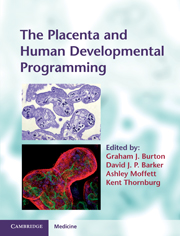Book contents
- The Placenta and Human Developmental Programming
- The Placenta and Human Developmental Programming
- Copyright page
- Contents
- Contributors
- Preface
- 1 Introduction
- 2 The maternal and placental origins of chronic disease
- 3 Pre- and periconceptual health and the HPA axis
- 4 Nutrition and preimplantation development
- 5 Maternofetal transport pathways during embryogenesis and organogenesis
- 6 Imprinted genes and placental growth
- 7 Genomic imprinting
- 8 Trophoblast invasion and uterine artery remodelling in primates
- 9 The role of the maternal immune response in fetal programming
- 10 Clinical causes and aspects of placental insufficiency
- 11 Uterine blood flow as a determinant of fetoplacental development
- 12 Placental amino acid transporters
- 13 The maternal circulation and placental shape
- 14 Glucocorticoids and placental programming
- 15 Clinical biomarkers of placental development
- 16 The placental roots of cardiovascular disease
- 17 Placental function and later risk of osteoporosis
- 18 Final general discussion
- 19 The placenta and developmental programming
- Index
3 - Pre- and periconceptual health and the HPA axis
Nutrition and stress
Published online by Cambridge University Press: 04 February 2011
- The Placenta and Human Developmental Programming
- The Placenta and Human Developmental Programming
- Copyright page
- Contents
- Contributors
- Preface
- 1 Introduction
- 2 The maternal and placental origins of chronic disease
- 3 Pre- and periconceptual health and the HPA axis
- 4 Nutrition and preimplantation development
- 5 Maternofetal transport pathways during embryogenesis and organogenesis
- 6 Imprinted genes and placental growth
- 7 Genomic imprinting
- 8 Trophoblast invasion and uterine artery remodelling in primates
- 9 The role of the maternal immune response in fetal programming
- 10 Clinical causes and aspects of placental insufficiency
- 11 Uterine blood flow as a determinant of fetoplacental development
- 12 Placental amino acid transporters
- 13 The maternal circulation and placental shape
- 14 Glucocorticoids and placental programming
- 15 Clinical biomarkers of placental development
- 16 The placental roots of cardiovascular disease
- 17 Placental function and later risk of osteoporosis
- 18 Final general discussion
- 19 The placenta and developmental programming
- Index
Summary
- Type
- Chapter
- Information
- The Placenta and Human Developmental Programming , pp. 17 - 34Publisher: Cambridge University PressPrint publication year: 2010



